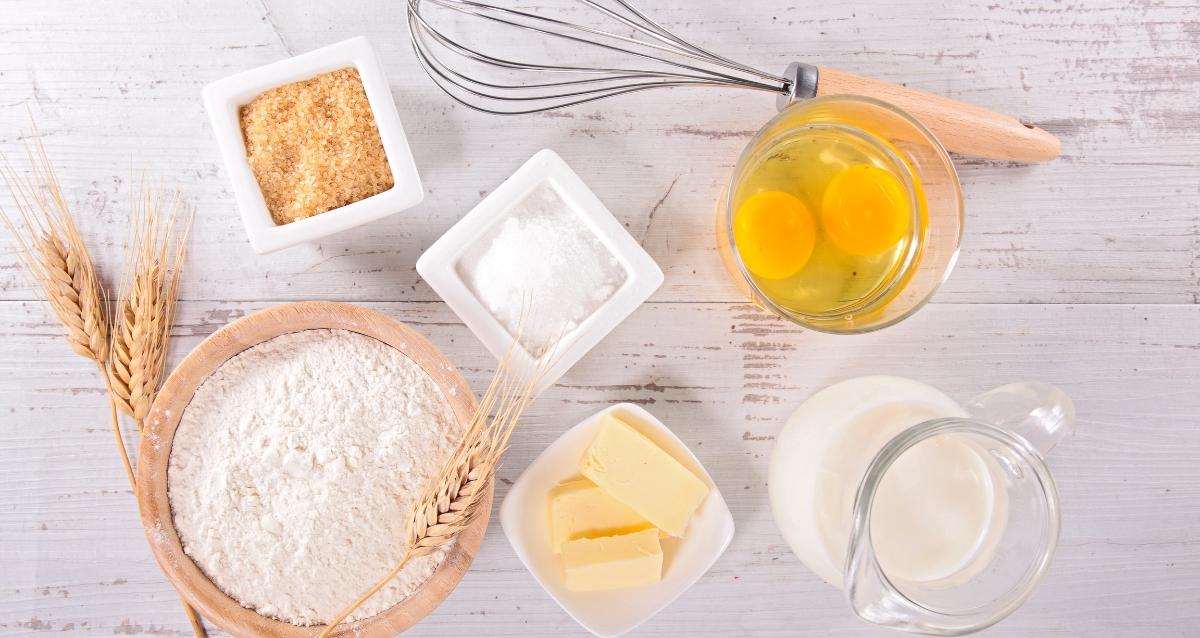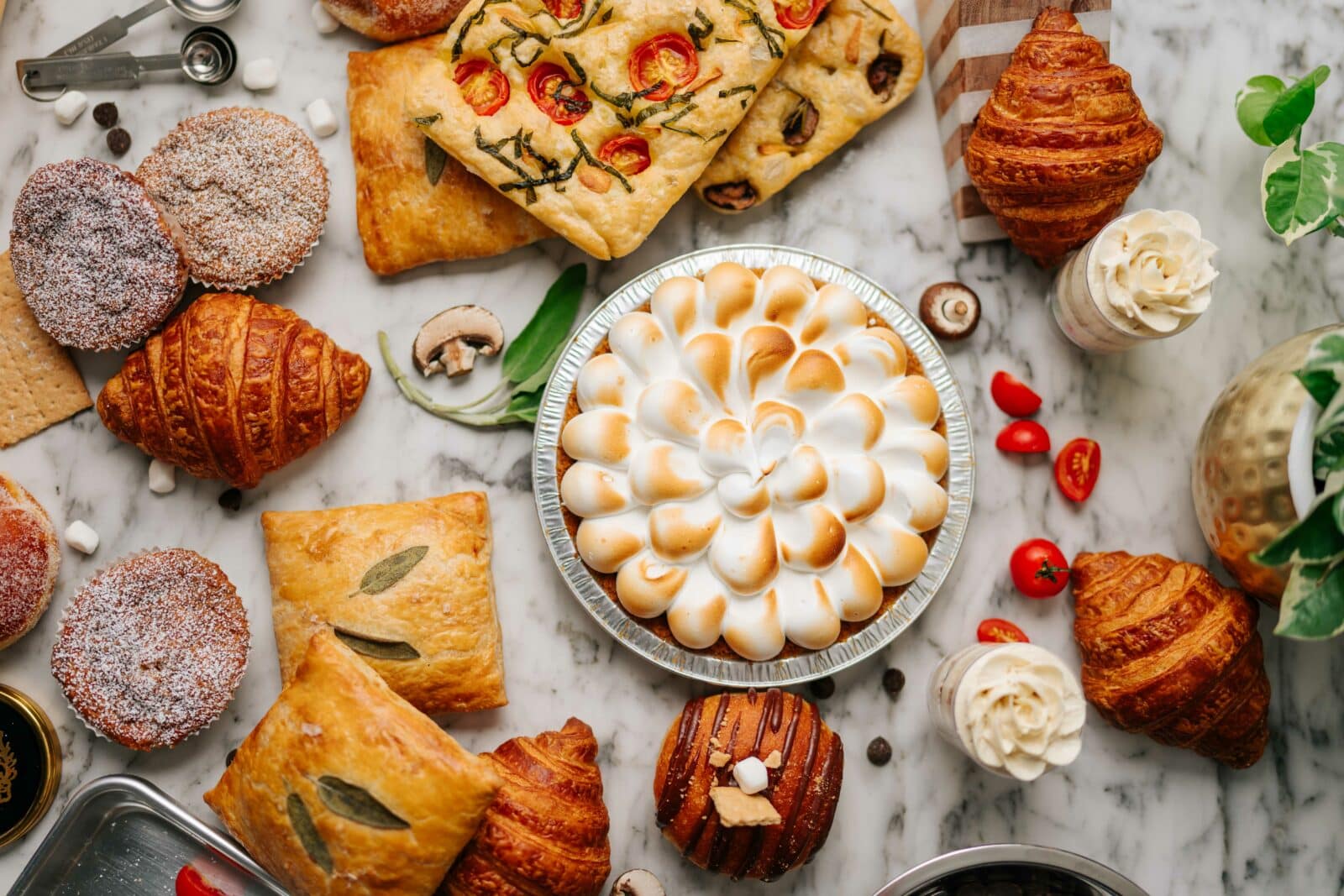Baking 101: 7 Essential Ingredients Every Baker needs
Are you a baking enthusiast who loves whipping up delectable treats? Or perhaps you’re a baking beginner who’s eager to learn the ropes and create some sweet treats of your own? Either way, one thing’s for sure – baking requires precision, patience, and, most importantly, the right ingredients.
In today’s blog, we’ll break down the basics of baking and introduce you to the top 7 essential ingredients every baker should have in their pantry (or fridge). So, let’s get started!
essential Baking Ingredients
It’s true what they say, the better your ingredients, the better your final product will be.
Baking is not only an art, but it’s also a science! Much like a scientist, a baker needs the correct ingredients and proportions to achieve the desired results. That’s why we’re here to break down what every home baker should understand about ingredients and the role they play in the baking process.
Whether you’re baking a cake, a loaf of bread, or a batch of cookies, the type and quality of the ingredients you use will greatly impact what comes out of the oven. For example, using self-raising flour instead of plain flour in a recipe can completely change the texture and taste.
Flour
Flour is a fine powder made from grinding grains, nuts, or other edible seeds. It is a staple ingredient in baking and provides structure, volume, and texture to baked goods. Many different types of flour are available, each with its unique properties and uses.
Every baker knows there is no substitute for good-quality flour. And while high-quality flour is a must for all recipes, the type of flour you use will depend on what you love to bake. That’s why it’s a good idea to have a variety of flours on hand, so you’re always prepared for any baking adventure!
Specifically, there are three essential flours that every baker should have at their disposal when baking:
Bread Flour
A good all-around bread flour (a type of flour with higher protein content than the other flour types) is excellent to have in your pantry so that you can bake any bread you want whenever you feel like it. Here at KBC, we use King Arthur, as it provides the proper structure for all our croissants and sourdough breads and is widely available in commercial supermarkets.
All-Purpose Flour
All-purpose flour is exactly what the name suggests – a versatile flour that can be used for various baking applications. This flour is made from a blend of hard and soft wheat and is suitable for making cakes, cookies, pastries, and other baked goods that don’t require a lot of gluten structure. In other words, this is the flour you will use 80% of the time when baking sweet treats at home.
Cake Flour
Cake flour is a type of flour that is specifically designed for baking delicate cakes. It is made from a blend of soft wheat and has a lower protein content than other flours, which results in a tender crumb structure. So, if you are a cake baker, having cake flour on the shelf will be quite helpful when baking anything delicate, like a sponge cake.
Sugar
What’s baking without sweeteners? Whether it’s for sweetening our coffee or adding a touch of sparkle to our cakes, sugar is an absolute must-have in your baking pantry.
Sugar gives baked goods their sweetness and provides a delicate balance to the flavors. While countless sweeteners are available nowadays, from old-fashioned cane sugar to alternatives like Splenda or coconut sugar, every baking pantry should have two types of sugar on hand: granulated cane sugar and brown sugar.
Granulated sugar is the original and go-to baking sweetener, and in our eyes, it’s an ingredient you can’t really bake without. The purpose of granulated sugar is to help baked goods rise, adding volume and a delicate, tender crumb. For most bakers, this type of sugar is the one you’ll reach for when you need to balance out the flavors in your favorite baked goods.
Brown sugar, on the other hand, is granulated sugar with molasses added to it. This gives brown sugar its signature soft texture and a subtle butterscotch-like flavor that pairs beautifully with spices like cinnamon and nutmeg. When baking, brown sugar provides a moisture boost, making it perfect for use in chewy cookies and soft cakes.
Leaveners
Leaveners are ingredients that cause baked goods to rise and become light and fluffy. Leaveners play an important role in determining the texture and structure of baked goods, so using the correct type and amount of leavener for your recipe is essential.
There are two basic leaveners you should always have ready in your cupboard: baking soda and baking powder.
Baking soda is a single ingredient, sodium bicarbonate, which is a base. When combined with an acid, it releases carbon dioxide, which causes baked goods to rise. Baking soda is a strong leavener, so too much can produce a bitter taste, while too little can result in flat, dense baked goods. Ultimately, baking soda helps to neutralize the acid in recipes and provides a soft, tender crumb.
Baking powder is one of the most common leaveners and is a combination of baking soda, an acid (usually cream of tartar), and a drying agent (usually cornstarch). When these ingredients are combined, they react to produce heat and gas – in other words, they rise! This means that baking powder already has everything it needs to create the reaction, making it a versatile tool.
Salt
Salt may seem like a simple ingredient, but it’s incredibly important in baking. Salt enhances the flavors of other ingredients and helps balance the sweetness. Salt also helps to control the yeast in bread dough and improves the structure and texture of baked goods.
Different types of salt can be used in baking, including table salt, sea salt, and kosher salt.
Table salt is the most common type of salt and is most commonly used in baking. It contains iodine, which helps to add flavor and enhance flavor profiles. Table salt also contains other minerals, such as magnesium and potassium, which are essential for activating some chemical reactions that give baked goods their unique flavors.
Kosher or sea salt is another popular type of salt often used in baking. It contains more than twice as much magnesium as table salt, which gives it a more robust taste and enhances the flavors of foods cooked with it. Kosher or sea salt also has trace minerals such as zinc, selenium, copper, manganese, molybdenum, and silicon that are essential for activating specific chemical reactions in baking.
Each salt type has its unique flavor and texture, so be sure to have your favorites stocked up so you can choose the right salt for your recipe!
Eggs
Baking is a classic and beloved American tradition, and one of the key ingredients in almost all pastries is eggs. In baking, eggs have many purposes, including binding the ingredients together, adding moisture, and contributing to the structure and texture. Eggs can also help brown the surface of baked goods, adding a beautiful golden color.
The size of the egg is important in baking, as the recipe usually specifies the size of the egg required. Typically, large eggs are the standard for most recipes, as they are ideal for separating yolks and whites for those treats that require one or the other.
Spices
Spices are the final touch to your baked goods and add a depth of flavor that makes all the difference. Some of the most commonly used spices in baking include cinnamon, nutmeg, vanilla extract, and ginger. These spices can be used on their own or combined with other ingredients to create delicious and aromatic baked goods.
While you could fill an entire cupboard with spices that could be used in baking, there are three essential spices that every baker should have on hand: cinnamon, nutmeg, and vanilla. These spices are some of the most common spices used in baking, adding warmth and depth to various tasty treats.
The right spices can elevate your baked goods from simple to extraordinary, so don’t be afraid to get creative and experiment with new flavor combinations!
Butter
Butter is one of the most essential ingredients in your baking pantry. The rich, creamy, and decadent ingredient brings your baked goods to life, giving them that irresistible buttery flavor and texture. So much so that we like to have a minimum of three pounds of butter available in our fridge at all times so that we’re always ready for spontaneous baking.
Butter is used for a variety of purposes in baking. It helps to create tender, flaky crusts in pies, pastries, and croissants. It also helps to provide structure and moisture to cakes, cookies, and bread. In addition to its delicious taste, butter adds richness and flavor to your baked goods.
Different types of butter are available, but salted and unsalted butter are the two most commonly used in baking. As the name suggests, salted butter contains salt, and unsalted butter does not. When baking, it’s recommended to use unsalted butter to better control the amount of salt in your recipe.
Having butter stocked in your pantry (well, more likely in your fridge) is essential for your baking success. So, don’t be afraid to add a stick (or two) to your grocery list and let the buttery goodness take over!
Baking in Action
Baking is a delicate art that requires the right ingredients to achieve the perfect result. Whether you’re a seasoned baker or just starting out, having these seven ingredients in your pantry will ensure that your baked goods turn out just right every time.
Here at Kirshenbaum Baking Co., we specialize in French-artisan baked goods and cookie deliveries, so you know that our pantry is always stocked with high-quality ingredients to bake fresh goods daily. From classic cookies to French-inspired pastries, we have something for everyone. So, why not treat yourself to a little taste of heaven today?
Stop by our bakery today and try our baked goods for yourself, or visit our online store to order your batch of our famous KBC cookies!









